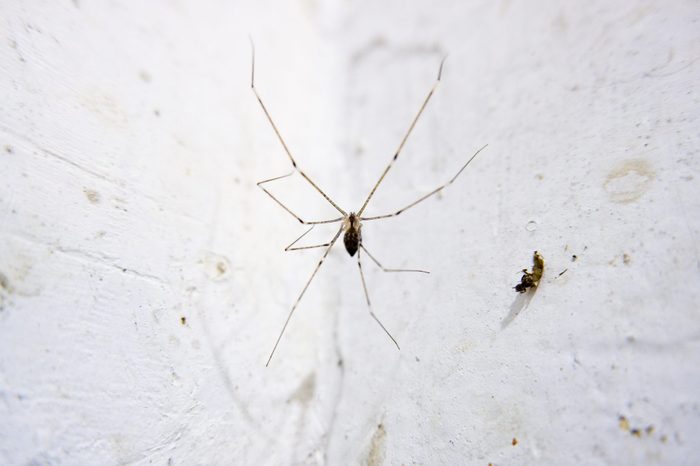7 Tips on How To Get Rid of Spiders in the Basement

Spiders and basements; with one comes the other. If spiders in your basement are too close for comfort, keep them away with these tips.
From dusty old cellars to finished basement game rooms, if you have a room underground, you have spiders. (You actually have spiders in nearly every room in your house, according to research by North Carolina State University.) The question is, what should you do about them?
Whether you need to control them is a subjective question, says Thomas Dobrinska, a board-certified entomologist at Ehrlich Pest Control. “In most cases, spiders are an important part of the ecosystem and actually feed on unwanted pests,” he says.
For people with a known reaction to arthropod bites and/or stings, one spider may be too many. That’s especially true with potentially dangerous black widow spiders and brown recluses, Dobrinska says. Aesthetics matter, too. Cellar spiders leave messy webs behind, he says, which can be unsightly.
“Lastly, many of us simply incur psychological effects by the mere presence of spiders that can be overwhelming,” Dobrinska says.
If any of these reasons apply to you and your basement, it may be time to try these expert tips to exclude them.
Seal Cracks and Crevices
“Preventing spiders, and most pests for that matter, from entering the home altogether is the most important aspect of pest management,” says Dobrinska.
If you have cracks in your foundation, brickwork, siding or any other exterior feature of your home, they’re open invitations for spiders. Dobrinska recommends sealing cracks around door and window frames with silicone sealant and tuck point masonry. For larger gaps around pipes and vents, use metal fill fabric and make sure all vents are working properly.
Reduce Clutter
Spiders love to hide in accumulated clutter. So if your basement has stacks of cardboard, piles of old newspapers or a bunch of unused equipment just sitting around, Dobrinska says it’s time to tackle the mess. Sweep webs away, too, and keep your basement clean so spiders don’t have a place to establish themselves.
Woodpile next to your back door? Move it farther away and clean up outdoor clutter just as your would in your basement. If you minimize spider habitat outside your home, they’ll have less of a chance to migrate inside and downstairs.
Install Door Sweeps
Door sweeps are simple and effective for excluding spiders, Dobrinska says. Lots of spiders just walk right into your home.
Once you’ve sealed up cracks and gaps, focus on the spaces beneath your doors by checking your door sweeps. If they’re broken or old, replacing them is an inexpensive way to keep mice and spiders out of your home — and by extension, your basement.
Alter Exterior Lighting
Spiders eat insects, and your security, porch and garden lights attract an endless supply of tasty bugs. Even your living room lights can be a magnet. Altering your exterior lighting will keep those web-spinners from taking a prime seat at the buffet.
Altering doesn’t mean extinguishing; you don’t have to live in total darkness to keep spiders at bay. “Instead, use sodium vapor bulbs that are less attractive to flying insects,” says Dobrinska. Close your blinds at night to block interior light from illuminating the outdoors. This will help fireflies, too.
Minimize Mulch
You know that attractive landscape mulch we spread liberally around our yard and garden? It’s also attractive to spiders. That’s because mulch provides food and shelter for lots of things spiders actively hunt, like insects and other arthropods.
Keep mulch away from your foundation to deter spiders from hanging out near easy-access paths into your home and basement. And use less of it in your yard, Dobrinska says.
Use Essential Oil
Essential oils are natural spider repellents, and some commercially-available products containing essential oils help temporarily deter spiders, Dobrinska says. Essential oil pesticides can stain porous materials and some work better than others, so temper your expectations.
Dobrinska notes essential oils give off a strong odor, so use them with caution in an enclosed space like your basement. “Exclusion, sanitation and storage practices need to be considered prior to any insecticide application,” Dobrinska says.
Sprinkle Diatomaceous Earth
Diatomaceous earth is a natural, mechanical insecticide made from the remains of diatoms, a type of unicellular algae. Diatomaceous earth’s tiny diatom skeletons scratch the spider’s exoskeleton and absorb its natural oils, causing it to dry out. That eventually kills the spider.
Dobrinska says diatomaceous earth is effective against spiders “as long as it is applied in the cracks and crevices where spiders are harboring.” Make sure the area is dry when you apply it or the particles won’t be effective.



